Sadly, New Zealand ranks as one of the most wasteful nations in the developed world. In a 2018 study by the World Bank, Kiwis were named as the tenth most wasteful in terms of our urban waste. We’re producing around 2kg of waste per person every day — that’s more than double the global average of 0.75kg — adding up to an annual total haul of rubbish of 730kg per Kiwi.
Cutting down on that waste starts with small changes in our homes. So get on board, live with the good of Mother Nature in mind, and implement a couple of our easy eco-friendly swaps:
Eco-Friendly Swap One: A reusable coffee filter instead of disposables
Maybe you’ve swapped takeaway coffee cups for a reusable one when you’re out and about, but have you considered using a reusable coffee filter? If you’re a filter coffee fan, these are easy to get your hands on. After use, simply dump your coffee grounds and rinse your filter under warm running water. Why not reuse your coffee grounds, too? Use grounds as a DIY shower scrub, compost them or scatter them around your plants to repel insects. You can even keep coffee grounds by the kitchen sink and use them to scrub your hands after chopping garlic or onions. The grounds will help rid the odour from your hands.
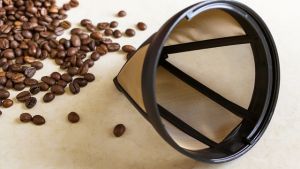
Eco-Friendly Swap Two: Silicone mats for baking instead of parchment paper
Parchment paper isn’t the most eco-friendly option, as often we use a sheet once and chuck it when we’re finished baking or cooking. But no one wants cookies with scorched bottoms. Silicone reusable baking mats to the rescue. They’ll ensure baking is golden and evenly cooked every time.
Eco-Friendly Swap Three: Soap nuts for washing over powders and liquids
Soap nuts are an environmentally friendly alternative to chemical detergent, native to India and Nepal. The nut contains a natural detergent called saponin. Its shell absorbs water and releases the saponins, which circulate as a natural surfactant in the wash water, freeing dirt and oils from your washing. Put 4-6 in a reusable muslin bag in your wash, and voila! Soap nuts can be re-used several times until the shells start to become soft and grey, then they can be composted.
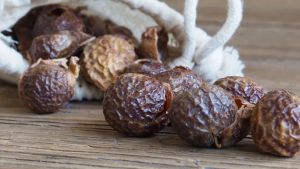
Eco-Friendly Swap Four: Homemade cleaning products instead of shop-bought sprays
With basic ingredients – lemon, water, baking soda and vinegar – you can create toxic-free all-purpose cleaners for your home. Sprinkle baking soda on your oven, leave it for a couple of hours and rinse it with vinegar to get rid of the residue. Sprinkle baking soda over your carpets before you vacuum them to absorb odours. For a homemade cleaning spray, combine:
- ¼ cup white vinegar
- 2 tablespoons baking soda
- 4 cups hot water
- ½ a lemon
Stir well and it’s ready to use.
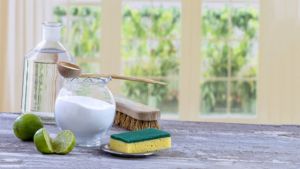
Eco-Friendly Swap Five: LED bulbs instead of energy inefficient light bulbs
Lighting is one of the easiest places to save energy around your house. You can replace incandescent light bulbs with energy efficient LEDs. You’ll save $100 or more a year on electricity in your house, according to energywise.govt.nz. For five hours of power, one LED light bulb uses 10W of power, while an incandescent light bulb will use a hefty 60W. They also reduce landfill and operate at a much cooler temperature, making them safer.
Compare electricity providers for free with Canstar!
Eco-Friendly Swap Six: Solar garden lights over electric lights
It’s worth investing in some good quality solar powered garden lights if you need a path lit at night around your home. Each light usually has its own solar panel that charges an internal battery to power the light. They are DIY, with no installation costs and zero electricity costs.
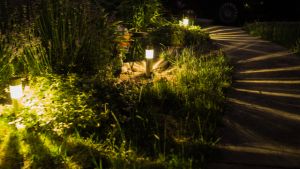
Eco-Friendly Swap Seven: Bars over liquid soaps
Try using a bar of soap in the shower instead of buying liquid body washes. Shampoo and conditioner bars are a great way to cut down on plastic waste, too. They’re generally made from natural ingredients and last just as long, if not longer, than a traditional bottle of shampoo.
Eco-Friendly Swap Eight: Bring your own takeaway containers instead of picking up more plastic.
Before you hit your Friday night takeaway spot this week, scour the house for a couple of containers to take along. You’ll be surprised how much waste you can prevent just by offering to have your curry, burger or sushi put in your own container.
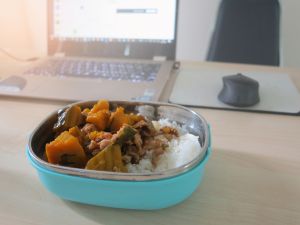
Eco-Friendly Swap Nine: Try dryer balls over fabric softener or dryer sheets
One-use dryer sheets are wasteful and can easily be replaced with dryer balls. They help separate the fabrics in your dryer, increasing airflow, which leads to shortened dryer times, softer clothes, and less static and wrinkles. Clothes dryers are up there with your fridge freezer and electric hob when it comes to power efficiency. If you’re in the market for a new dryer and are curious about their efficiency, click below to compare them with Canstar.
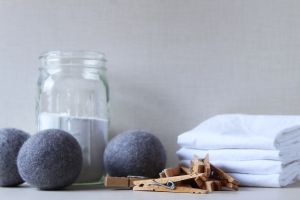
Compare clothes dryers for free with Canstar!
Eco-Friendly Swap Ten: Compost over sending to landfill
Composting is a great way to send the goodness of your organics back to the garden, and it’s easier than you think. If you have the space, consider setting up a compost bin in your backyard for food scraps, garden prunings, grass and dead leaves. Try a worm farm to dispose of food scraps and small amounts of paper.
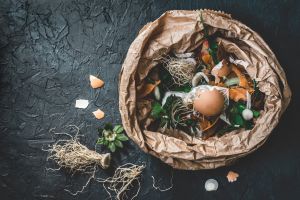
Or if you have a small space, a Bokashi fermentation bucket is good for getting rid of food scraps, including meat and cooked leftovers. Most local councils also have guides on their websites to places where you can drop off compostable waste in your community.


Share this article